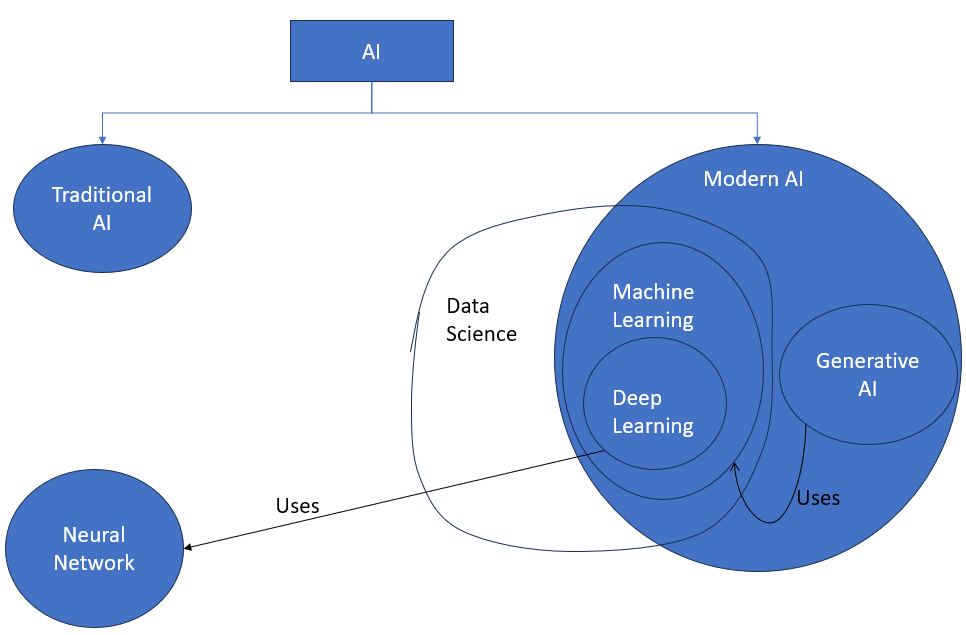AI
AI is broad term that encompasses any technique that enables computers to mimic human intelligence. This includes tasks like recognizing speech, making decisions, translating languages, and playing games.
Traditional AI
It is a subset of AI that focuses on specific tasks and operates based on predefined rules and algorithms.
Modern AI
It usually refers to the more recent advancements in the field, particularly those involving Machine Learning (ML) and Deep Learning (DL). While all modern AI is AI, not all AI is modern AI.
Traditional AI relies more on predefined rules and logical reasoning, whereas modern AI emphasizes learning from data and adapting to new information.
Generative AI
It is a subset of AI that focuses on creating new content. It learns patterns from existing data and then using those patterns to create something new like text, images, music, and code. It is a specialized area within Modern AI.
Machine Learning
A subset of Modern AI focused on developing algorithms and models that allow computers to learn from and make predictions or decisions based on data. These models improve their performance over time based on the data they process.
ML uses various techniques to extract patterns from data. Primary techniques are Supervised learning, Unsupervised learning, Reinforcement learning
It is useful in fields like Spam detection, recommendation engines, and predictive analytics.
Deep Learning
Deep learning is a specialized form of Machine Learning that uses Neural networks with many layers (hence “deep”) to model complex patterns in data. It is being used in Image recognition, language translation, and autonomous vehicles and many other places.
Deep learning techniques involve various types of neural networks and architectures that allow computers to learn complex patterns from large datasets. That are Convolutional Neural Networks (CNNs) for image processing, Recurrent Neural Networks (RNNs) for sequence data, Feedforward Neural Networks(FNNs) and etc.
Neural Networks
A computational model inspired by the structure and function of the human brain. It consists of interconnected nodes (neurons) organized in layers. It can be shallow (with a few layers) or deep (with many layers), used in various types of learning tasks.
Neural Networks are the foundational models used in deep learning. Deep Learning specifically refers to neural networks with many layers.
Data Science
Data Science is an interdisciplinary field that combines statistical analysis, data processing, and machine learning to extract insights and knowledge from data.
It involves a combination of mathematics, statistics, computer science, and domain expertise to analyze large volumes of data and uncover hidden patterns, trends, and correlations. It also includes data collection, cleaning, analysis, and interpretation.
It is useful in Business intelligence, health informatics, and personalized recommendations.
Relationships between the above concepts
Machine learning is foundational to both Modern AI and Generative AI. Generative AI is a specialized area within Modern AI that uses Machine Learning techniques to generate new content, but ML as a field includes a wider range of applications beyond just content generation. Generative AI is one application area within the broader field of Machine Learning.
Deep learning is a specialized form of Machine Learning that uses Neural networks. In simple terms, DL is a subset of ML. Neural Networks are indeed a central component of deep learning but are also utilized in various other fields and applications.
Deep Learning is also used in Natural Language Processing(NLP), Speech Recognition and Synthesis, Image and video processing, Medical image analysis, Anomaly detection, Financial forecasting other than Generative AI.
Machine Learning is a Subset of Data Science. Machine Learning is one of the methods used within Data Science to build predictive models and analyze data. Data Science encompasses a broader range of activities beyond machine learning, including data preprocessing, exploratory analysis, and visualization.
Data science plays a supportive role in Traditional AI by preparing and analyzing data, which can enhance rule-based systems and knowledge bases.
In Modern AI, Data science is central to the development and application of machine learning and deep learning techniques, driving insights, model development, and evaluation.
